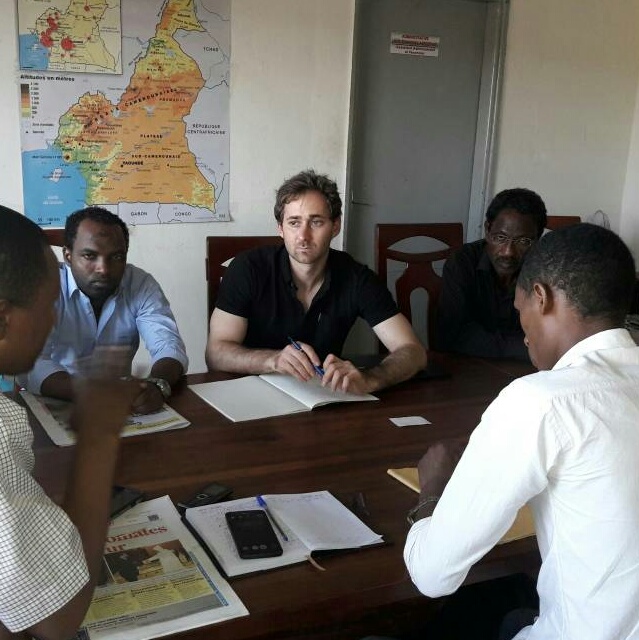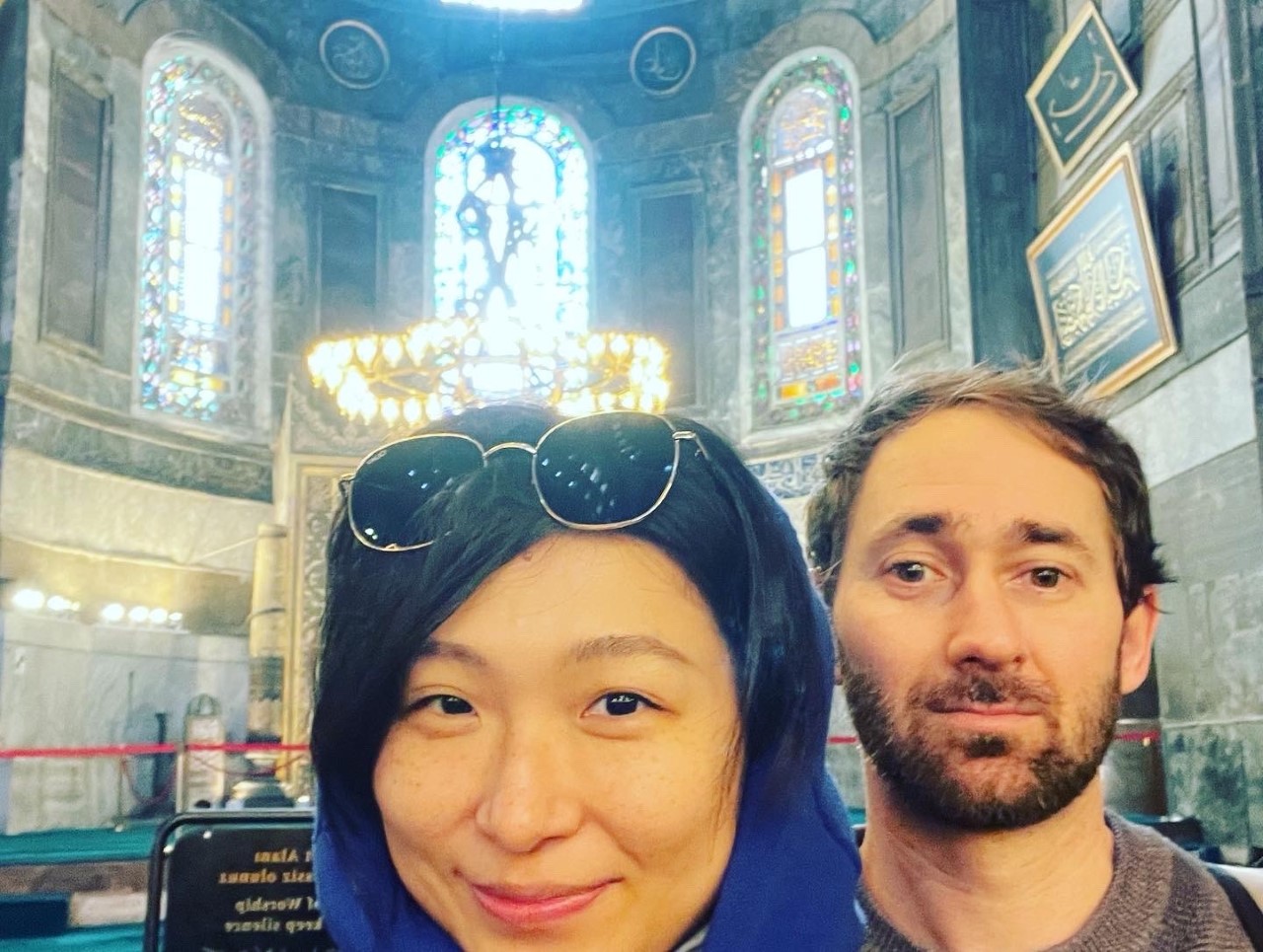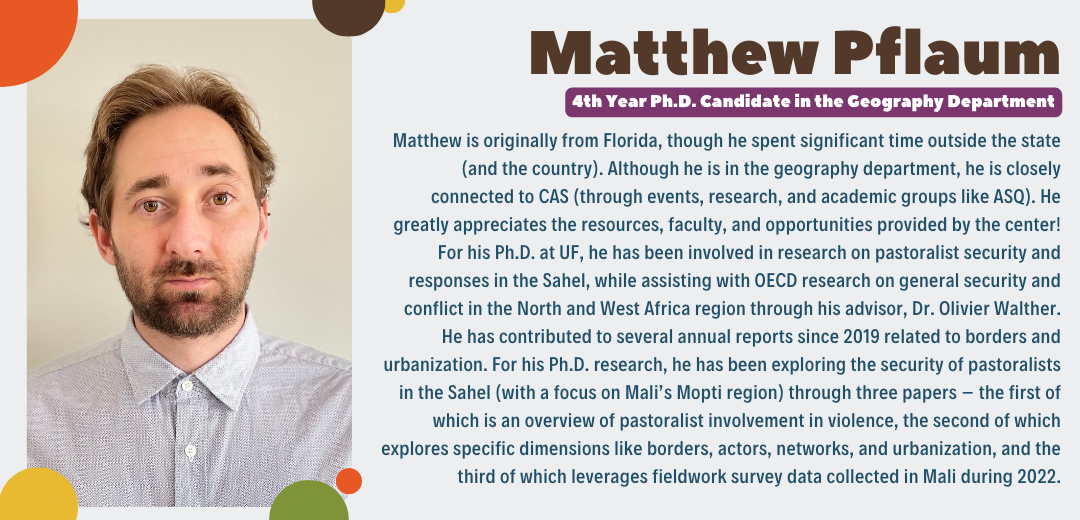Matthew is originally from Florida, though he spent significant time outside the state (and the country). He is a graduate student in the geography department, and he is closely connected to CAS (through events, research, and academic groups like ASQ). He greatly appreciates the resources, faculty, and opportunities provided by the center! He greatly appreciates the resources, faculty, and opportunities provided by the center!
 Several years ago, Matthew had the privilege to spend a day with a hunter-foraging group (the Hadzabe) in Tanzania and was immediately struck by the nature of their livelihoods in terms of small family units, flexibility, adaptation, and resilience to scarcities. Then he later did research on land tensions and tenure in the East Region of Cameroon between farmers and herders for his MSc fieldwork at the University of Edinburgh, and he then decided to dedicate his academic research and career to these topics.
Several years ago, Matthew had the privilege to spend a day with a hunter-foraging group (the Hadzabe) in Tanzania and was immediately struck by the nature of their livelihoods in terms of small family units, flexibility, adaptation, and resilience to scarcities. Then he later did research on land tensions and tenure in the East Region of Cameroon between farmers and herders for his MSc fieldwork at the University of Edinburgh, and he then decided to dedicate his academic research and career to these topics.
Matthew has been involved in research on pastoralist security and responses in the Sahel while assisting with OECD research on general security and conflict in the North and West Africa region through his advisor, Dr. Olivier Walther. He has contributed to several annual reports since 2019 related to borders and urbanization. For his Ph.D. research, he examines the security of pastoralists in the Sahel (with a focus on Mali’s Mopti region) through three papers – the first of which is an overview of pastoralist involvement in violence, the second of which explores specific dimensions like borders, actors, networks, and urbanization, and the third of which leverages fieldwork survey data collected in Mali during 2022. By collecting insecurity, response, and demographic data from three regions of Mali, he has tried to combine conflict and security data with livelihood and mobility data, in essence, to both socialize and spatialize insecurity data. Thus, experiences of insecurity can be compared empirically both between regions of Mali (Sikasso, Bamako, Mopti, etc.) and within and between livelihoods (commerce, farmers, herders). Data was also collected on critical topics like the number of movements, places where respondents feel insecure, major insecure events, vulnerability for children, and many other topics that will be invaluable for examining the localized and social/livelihood vulnerabilities for insecure across regions and communities in Mali.
 Matthew’s wife is three years into a faculty position in Grenoble, France. He also plans to go into academia, so their long-term plans involve staying in that region of France or moving somewhere new. In academia, Matthew plans to continue research along themes in security, mobility, and livelihoods of groups like pastoralists in the Sahel, hopefully expanding his research beyond Mali to include other countries like Burkina Faso and Niger and countries that have more recently experienced insecurity like Togo and Benin. He is also interested in teaching and partnerships in research with multi-disciplinary colleagues in environmental sciences, political science, anthropology, and other disciplines. There is a significant need for bridging these different research topics and disciplines in regions like the Sahel.
Matthew’s wife is three years into a faculty position in Grenoble, France. He also plans to go into academia, so their long-term plans involve staying in that region of France or moving somewhere new. In academia, Matthew plans to continue research along themes in security, mobility, and livelihoods of groups like pastoralists in the Sahel, hopefully expanding his research beyond Mali to include other countries like Burkina Faso and Niger and countries that have more recently experienced insecurity like Togo and Benin. He is also interested in teaching and partnerships in research with multi-disciplinary colleagues in environmental sciences, political science, anthropology, and other disciplines. There is a significant need for bridging these different research topics and disciplines in regions like the Sahel.

